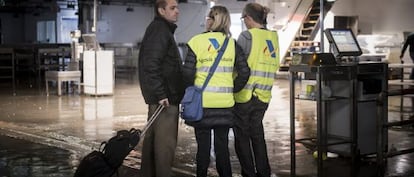Tax inspectors turn their gaze onto the tourist sector
2015 action plan will focus on hospitality, the self-employed and shell corporations


This year, the taxman will be targeting tourism.
The Tax Agency’s newly released 2015 Fiscal and Customs Control Plan, a guide of priority action, focuses on one of Spain’s most reliable industries and one of the few sectors that has continued to perform well in the midst of the crisis.
Agency workers will also use computerized search programs to find relevant online information about inspection targets, and keep tabs on self-employed workers, shell corporations and celebrities from the world of arts, entertainment and sports.
“In the sphere of businesses aimed at leisure activities and the tourism sector in general, there will be controls over cash volumes at sales points, and there will also be action to uncover undeclared income from private tourist accommodation businesses,” said Santiago Menéndez, director general of the Tax Agency, in a congressional appearance earlier this year.
Menéndez warned that inspectors would check online offers for tourist accommodation.
The head of the Tax Agency had already told Congress that agency employees will rely a lot more on computer work to carry out their inspections. In particular, inspectors will look for special accounting programs that allow some businesses to channel transactions to a parallel, undercover ledger system whose income goes undeclared.
Businesses that deal in cash will also be particularly targeted, according to this year’s anti-fraud action plan.
Last year, 2,675 professionals were subjected to tax inspections, a 35 percent rise from the previous year.
The guidelines also mention major corporations and the possible use of tax havens for evasion. Last year inspectors claimed back €1.75 billion from large companies, representing 35 percent of all the back taxes obtained by the inspection service.
Tu suscripción se está usando en otro dispositivo
¿Quieres añadir otro usuario a tu suscripción?
Si continúas leyendo en este dispositivo, no se podrá leer en el otro.
FlechaTu suscripción se está usando en otro dispositivo y solo puedes acceder a EL PAÍS desde un dispositivo a la vez.
Si quieres compartir tu cuenta, cambia tu suscripción a la modalidad Premium, así podrás añadir otro usuario. Cada uno accederá con su propia cuenta de email, lo que os permitirá personalizar vuestra experiencia en EL PAÍS.
¿Tienes una suscripción de empresa? Accede aquí para contratar más cuentas.
En el caso de no saber quién está usando tu cuenta, te recomendamos cambiar tu contraseña aquí.
Si decides continuar compartiendo tu cuenta, este mensaje se mostrará en tu dispositivo y en el de la otra persona que está usando tu cuenta de forma indefinida, afectando a tu experiencia de lectura. Puedes consultar aquí los términos y condiciones de la suscripción digital.








































